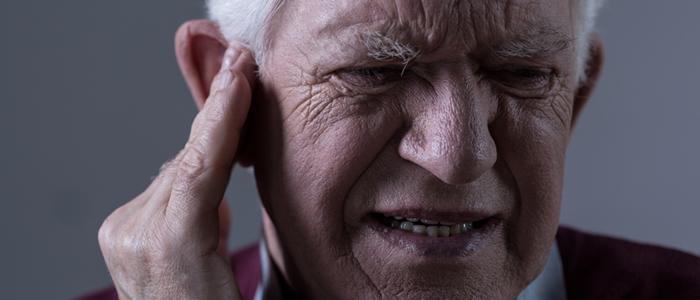
Tinnitus
Tinnitus, more commonly known as “ringing in the ears,” is the sensation of hearing noises that don’t appear to have a source. In addition to ringing, people with tinnitus might hear chirping, buzzing, whistling, or hissing. The noises can be intermittent or constant. Pulsatile tinnitus is a rare form in which the noise seems to be in synch with the patient’s heartbeat. The regular form of tinnitus is quite common, and affects about 30-50 million adults in the United States.
Causes of Tinnitus
Tinnitus is caused by a combination of hearing loss and hormonal changes in the brain triggered by stress, poor sleep, anxiety, depression or fatigue. Many patients with tinnitus also have noise-induced hearing loss. Loud noises can damage the cochlea, an organ located in the inner ear. It has cells that are sensitive to sound and send an electrical signal to the brain, which then interprets the signal as a specific noise. If the inner ear cells are damaged, the brain cells that perform the function of hearing do not die and will have abnormal activity which is interpreted by the rest of the brain as tinnitus.
Individuals who use noisy equipment or machines, like jackhammers or chainsaws, are most at risk for developing tinnitus. Tinnitus is a common hazard of such occupations like rock musician, pilot, carpenter, or street-repair worker. People who listen to portable music devices and play them loudly also risk developing tinnitus.
Additionally, tinnitus can be part of the aging process. As people get older, their hearing deteriorates, and hearing loss is another cause of tinnitus. Age-related hearing loss generally starts at about 50 years of age.
In some cases, an ear infection causes a buildup of wax in the ear. That buildup causes a blockage that can irritate the eardrum and/or cause hearing loss. Some medications can also cause tinnitus. A partial list includes aspirin, ibuprofen, etc. This effect is reversible.
Various medical conditions can also contribute tinnitus. They include Ménière’s disease, which affects the inner ear, and otosclerosis, which affects the bones in the middle ear.
Treatments
Treatment for tinnitus varies, and it depends on what is causing it. If the patient has a buildup of ear wax, the doctor will treat the resultant blockage and remove the earwax.
Since a large majority of tinnitus patients also have hearing loss, they will be treated accordingly. Hearing aids are common treatments for such patients. In patients with severe to profound hearing loss, the cochlear implant can be placed which sends electrical signals from the ear to the brain and thus takes over the cochlea’s job.
There are also a number of ways to make the noises themselves more tolerable. White noise machines are particularly helpful for people whose symptoms are worst at night. The devices emit soothing sounds like that of falling rain. Masking devices are white noise machines that can be worn like hearing aids. Customized sound therapy has been found to be much more effective than white noise for the treatment of tinnitus. The researchers at UC Irvine have developed two such customized sound therapy systems including the beyondtinnitus.com and serenade device.

